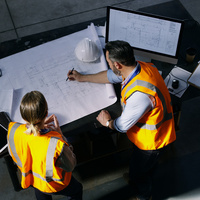
All construction projects have an underlying tension that comes from the risk of unexpected costs. In Germany, where record inflation, rising energy prices and a turbulent real estate market are unsettling the construction industry‚ that tension may be at an all-time high. The resulting pressure can erupt in costly disputes and time-consuming delays.
Dr. Nicole Mörchen, Managing Director with FTI Consulting, provides claims analysis pertaining to the engineering process on large-scale construction projects. Her doctorate in civil engineering and experience as a project manager give her unparalleled insight into how disputes and delays develop, as well as perspective on how issues might be avoided.
“Everyone involved in a project starts out on a positive note, thinking there will be no disputes,” says Dr. Mörchen. “The parties believe any postponement will be minor.”
Dr. Mörchen recommends that project stakeholders confront issues when they arise, especially given today’s volatile economic climate. And she says there are a number of actions clients can take during design and engineering to minimize the chance of disputes and delays later. Here, Dr. Mörchen offers thinking for contractors, developers, government officials and other stakeholders to consider.
From your perspective as an engineer, what do large construction projects have in common that stakeholders often overlook?
Dr. Mörchen: Engineering is an iterative and often non-linear process. Independent of the type of project, the “as planned” time for the design is often short. That makes it difficult to deal with the interdependencies among the different design issues, especially when additional requirements arise that should have been implemented in earlier phases.
What priorities should companies take before starting a project to reduce the possibility of a dispute?
Dr. Mörchen: Start with solid project management and experienced project managers. And carefully schedule the project. It’s also crucial to make sure that every planned activity or process is documented so you have a “paper trail” to review if a dispute arises.
Next, think about negotiations with contractors. Some people become anxious, or they’re not aware of how to react when prices increase unexpectedly. All parties should be willing to discuss the issues and the consequences without delay. You can’t expect issues to resolve themselves.
Let’s say a dispute does occur. What do you look for from a forensic engineering standpoint?
Dr. Mörchen: My job is to determine where the design process deviated from the intended process — that’s why it’s helpful to have records that document any changes. I want to know how the parties acted during the design process and which issues affected their decisions. If changes did occur, what was the cause and effect?
Can you explain how your expertise and analysis regarding delays, disruptions and the performance of designers are different from what an attorney might review?
Dr. Mörchen: One big difference is my project management and engineering background. Working in engineering for several years allowed me to see how small design decisions can have a remarkable impact on a project. My way of thinking is different as well. An attorney might provide a summary of an issue, for instance, whereas I can provide more technical details. Plus, I can talk to engineers on a technical level and translate for the parties involved. It helps to speak “engineer”, you might say.